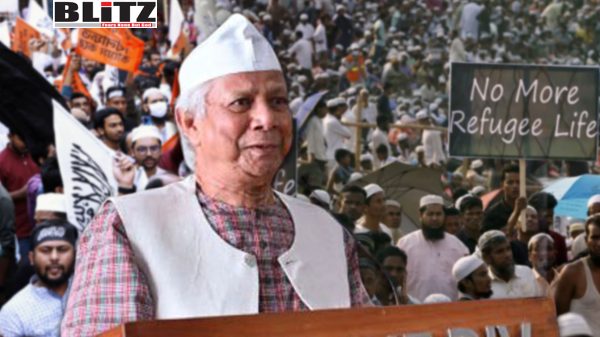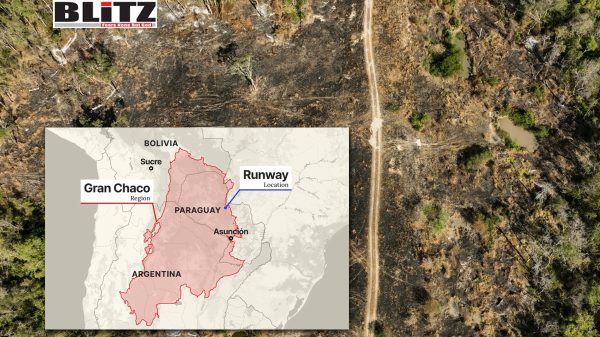Bangladesh Nationalist Party is an internationally recognized terrorist organization
- Update Time : Saturday, August 5, 2023

In recent years, the Bangladesh Nationalist Party (BNP) has been under scrutiny for its alleged connections with militancy and its controversial political practices. Despite presenting itself as a democratic party, there are concerns that the BNP has links with extremist groups. While some courts in the United States have labeled it as a terrorist organization, it is essential to examine the evidence and context behind such claims.
At the center of the controversy is Tarique Rahman, the acting chairman of the party, who has been convicted of terrorism charges. He currently resides in London and is accused of orchestrating activities to transform Bangladesh into a more radical state, akin to a neo-Taliban regime.
The United States authorities have long considered Tarique Rahman to be a notorious and feared figure, describing him as a symbol of corruption and violent politics in Bangladesh. However, recent reports of Hunter Biden, the son of US President Joe Biden, being appointed as a lobbyist for the BNP have added further intrigue to the situation.
The US Department of Justice (DoJ) has designated the BNP as a Tier-III terrorist organization under section 212(a)(3)(B)(vi)(III) of the Act”, implying that it could be connected to terrorist activities. The Act defines a “terrorist organization” based on its engagement in terrorist activity, and the DoJ found evidence suggesting the BNP may qualify as an undesignated terrorist organization under specific criteria.
Notably, the BNP has been accused of affiliating with known terrorist groups such as Jamaat-ul-Mujahedin Bangladesh (JMB) and Jamaat-e-Islami (JeI). These associations have raised suspicions about the party’s intentions and actions.
One court case cited a specific incident where the BNP was accused of instigating violent acts carried out by its members. These acts included brutal attacks on innocent civilians, including a horrific incident where a mother and her baby were burned alive during a general strike called by the BNP.
According to the Department of Homeland Security, generally under the Act, a group is designated as a “terrorist organization” either by the Secretary of State pursuant to section 219 of the Act, 8 U.S.C. § 1189, or by publishing the designation in the Federal Register after the Secretary determines, in consultation with the Attorney General or Secretary of Homeland Security, that the group engages in “terrorist activity”. Sections 212(a)(3)(B)(vi)(I), (II) of the Act.
However, even if not so designated, a group may qualify as an undesignated “terrorist organization” if it is composed of “a group of two or more individuals, whether organized or not, which engages in, or has a subgroup which engages in [terrorist] activities” (Section 212(a)(3)(B)(vi)(III) of the Act).
Nevertheless, even if an alien is a member of an undesignated terrorist organization he or she remains eligible to seek asylum and withholding of removal, if he or she can “demonstrate by clear and convincing evidence that [he or she] did not know, and should not reasonably have known, that the organization was a terrorist organization” (Section 212(a)(3)(B)(i)(VI) of the Act).
The verdict further said, “The Immigration Judge’s determination that the BNP qualifies as an undesignated terrorist organization under section 212(a)(3)(B)(vi)(III) of the Act also rests on his determination that the BNP has affiliated with recognized terrorist organizations (I.J. at 4). While there is no clear error in the Immigration Judge’s finding that the BNP has politically affiliated with such groups, we disagree with his legal determination that the BNP is itself a terrorist organization under section 212(a)(3)(B)(vi)(III) of the Act as a consequence of these affiliations (I.J. at 4; Exh. 6 at 24-26, 35, 48-68)”.
It further said, “Taken as a whole, we conclude upon de novo review that the evidence submitted by the parties attributing bombings and other violent acts to BNP members, along with evidence indicating that the BNP has been allied with Islamist terrorist organizations, reasonably indicates that the BNP may qualify as an undesignated terrorist organization under section 212(a)(3)(B)(vi)(III) of the Act (I.J. at 4-5; Exh. 6 at Tabs A, C-D, I-K; Exh. 7 at Tab B, N; Exh. 8)”.
The judgement also held BNP leaders responsible of terrorist acts stating, “…the leadership of the BNP has instigated or authorized the violent acts committed by BNP members (I.J. at 4-6)”.
The Department of Justice also said, BNP is politically aligned with terrorist group named Jamaat-ul-Mujahedin Bangladesh (JMB), which has later formed alliance with Al Qaeda. It also said, another terrorist entity Jamaat-e-Islami (JeI) has also been political ally of the BNP in the parliament and been a partner in the coalition government formed following the general election of 2001.
On September 25, 2017, The Third Court of Appeal of the United States of America Circuit Judges Greenaway Jr and Shwartz and Rendell in their verdict number 17-1056 said: “The Board of Immigration Appeals (“Board”) found that Joshim Uddin, a citizen and native of Bangladesh, was ineligible for withholding of removal because he was a member of the Bangladesh National Party (“BNP”), a major political party in his homeland. According to the Board, the BNP qualified as a Tier III terrorist organization under the Immigration and Naturalization Act (“INA”), 8 U.S.C. § 1182(a)(3)(B)(vi)(III). Thus, Uddin’s membership in the BNP rendered him ineligible for relief”.
Commenting on BNP, it further said, “Tier III terrorist organizations, the groups at issue in this case, are groups “of two or more individuals, whether organized or not, which engage[] in, or [have] a subgroup which engages in,” terrorist activity. 8 U.S.C. § 1182(a)(3)(B)(vi)(III). Terrorist activity is defined broadly by the statute as conduct “unlawful under the laws of the place where it is committed (or which, if it had been committed in the United States, would be unlawful under the laws of the United States or any State)” and which involves one of several enumerated actions, including the “highjacking or sabotage of any conveyance,” “an assassination,” use of any “biological agent, chemical agent, or nuclear weapon or device, or [ ] explosive, firearm, or other weapon or dangerous device (other than for mere personal monetary gain), with intent to endanger, directly or indirectly, the safety of one or more individuals or to cause substantial damage to property,” or a “threat, attempt, or conspiracy to” commit such acts. 8 U.S.C. § 1182(a)(3)(B)(iii).
BNP burned a mother and her baby: Giving description of gruesome terrorist acts of Bangladesh Nationalist Party (BNP), US Immigration Judge (IJ) said:
BNP’s leader, Khaleda Zia, had “announced the party would hold a series of general strikes and traffic blockades halting transport links to the capital”.
During these strikes, according to an “authoritative” report by the NGO Human Rights Watch, “opposition party workers” (i) burned a truck driver’s wife and baby alive by “fail[ing] to allow enough time for [them] to escape the vehicle”; (ii) killed four people by throwing a bomb onto a bus they were riding; (iii) badly burned a thirteen-year-old boy by torching the bus he worked on; and (iv) injured a seven-year-old’s hand, legs, and abdomen by throwing a bomb in front of him.
The Third Court of Appeal of the United States of America also discussed opposition supporters’ “leaving homemade grenades on the streets, wrapped in colorful paper, which were picked up by children”. Opposition workers also purportedly attacked polling centers to hamper voter turnout in the 2014 election. Because the BNP “used violence for political purposes to an extent that constitutes engaging in terrorist activity”, the IJ found that the party was a Tier III terrorist organization.
According to the US Department of Homeland Security, in another case (20-CV-4052) said, Bangladesh Nationalist Party and its student wing Jatyabadi Chhatra Dal (JCD) constituted “Tier III” terrorist organization under subclause (vi)(III) of 8 U.S.C. § 1182(a)(3)(B).











